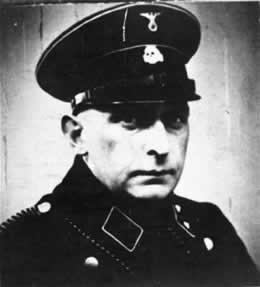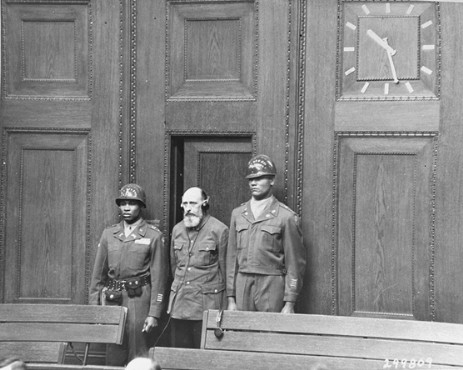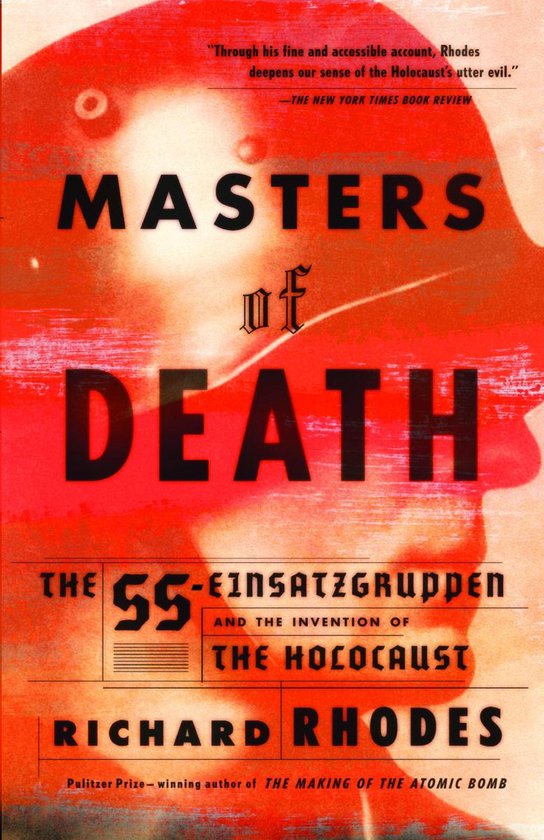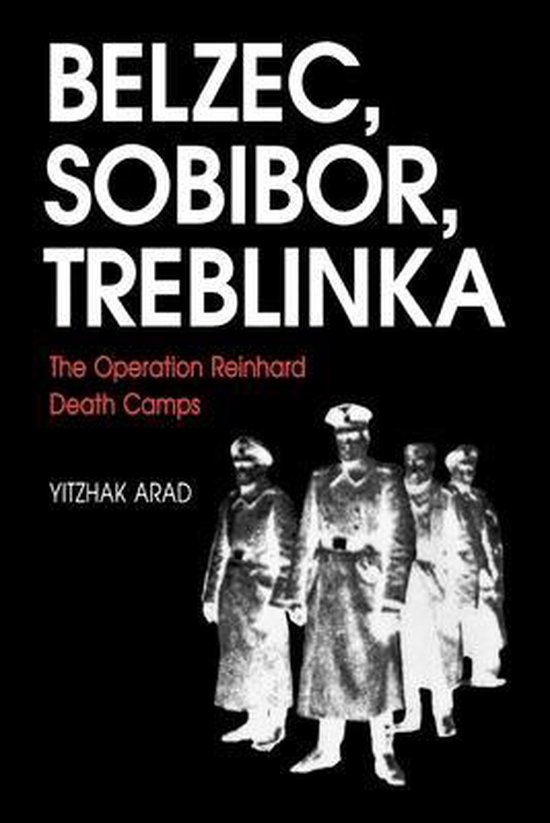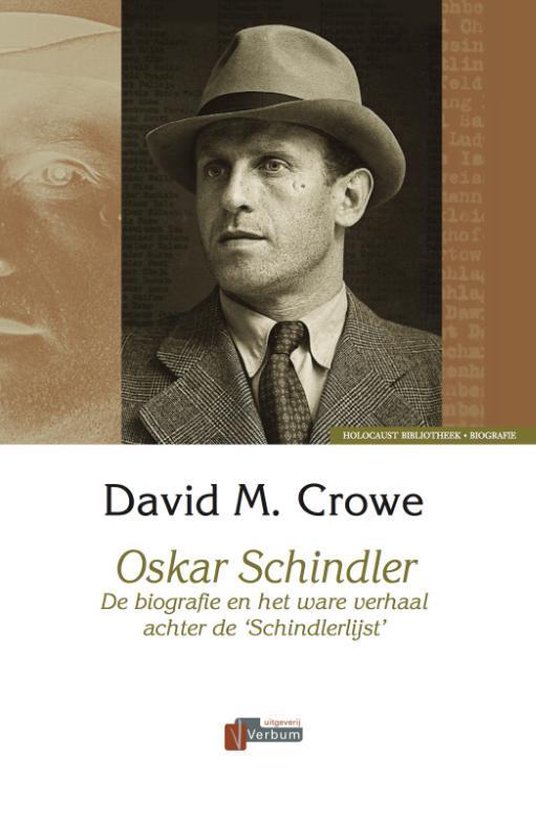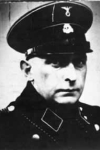Introduction
Paul Blobel was the leader of Sonderkommando 4a, a part of Einstazgruppe C. The Einsatzgruppen were tasked with executing communists, partizans, Jews and others in the Soviet Union. Blobel’s Sonderkommando 4a became notorious by the mass execution of no less than 33.771 Jews in Babi Jar, a ravine near Kiev. Blobel also commanded Aktion 1005, the operation aimed at erasing the traces of the mass extermination in the East. According to his service record, Blobel was "an energetic personality with good qualities of leadership" and because of his cruelty and bloodthirstyness he was the ideal man for all these dirty jobs. After the war he showed no remorse and hid behind the orders of his superiors he had had to obey as a soldier.
Definitielijst
- Aktion 1005
- German secret operation to cover up the traces of mass extermination in the east. The bodies of the victims of the Einsatzgruppen and extermination camps were dug up from the mass graves and then burned. The operation was under command of SS-Standartenführer Paul Blobel.
- Jews
- Middle Eastern people with own religion that lived in Palestine. They distinguished themselves by their strong monotheism and the strict observance of the Law and tradition. During World War 2 the Jewish people were ruthlessly persecuted and annihilated by the German Nazis. . An estimated 6,000,000 Jews were exterminated.
- Soviet Union
- Soviet Russia, alternative name for the USSR.
Images
The beginning
Paul Blobel was born August 13th, 1894 in Potsdam, the son of a craftsman. He completed a vocational education in stonemasonry and carpentry and afterwards studied construction for a year. He was employed as a carpenter until the outbreak of World War One. During the war he served in the Engineers. He was awarded the Iron Cross 1st Class and in 1918 he had risen to the rank of vize-Feldwebel. He left the army and was unemployed until 1919. In 1919 and 1920 he again studied construction. He worked as an architect in various firms from 1921 to 1924. In 1924 he settled down as an independent architect.
Blobel married a girl from the better circles. His career also flourished but that came to an end in 1929. Owing to the economic crisis in Weimar-Germany, he received no orders anymore and he had to sustain himself on a social security allowance from 1930 to 1933. Until the spring of 1935 he was employed as a clerc by the municipal administration of Solingen. Like so many Germans, who were pessimistic about the future as a result of their umemployment and the economic crisis, Blobel joined the Sturmabteilung (SA) in October 1931, the storm troopers who guarded, among other things, the party meetings of the N.S.D.A.P. against socialists and communists, the archenemies of the Nationalsocialists. Ironically, Blobel was also a member of the S.P.D., the Sozialdemokratische Partei Deutschlands.
His S.P.D. membership must have been of short duration because on December 1st, 1931 he definitely sided with Nationalsocialism by joining the N.S.D.A.P. He also joined the Schutzstaffel (SS), the organisation tasked with all kinds of security and police matters during the years of the Third Reich. From the beginning of 1932 he was employed by the Sicherheitsdienst (SD), the intelligence service of the SS directed by Reinhard Heydrich (Bio Heydrich). Here he occupied himself with spying on socialdemocrats and communists. At first he worked for the SD in Düsseldorf and was later promoted to chief of the SD-Leitabschnitt, the SD district of Salzburg, Austria. Janauary 30th, 1941, Blobel was promoted to SS-Standartenführer.
Definitielijst
- Iron Cross
- English translation of the German decoration Eisernes Kreuz.
- Schutzstaffel (SS)
- The Schutzstaffel commanded by Heinrich Himmler was a very powerful organisation within the Third Reich. The original goal of the SS was to protect Adolf Hitler and other Nazi’s but soon the SS was deployed for several military, security and police tasks. The SS guarded inter alia the concentration camps and manned the Einzatzgruppen. The armed branch of the SS was the Waffen-SS.
- Sicherheitsdienst (SD)
- The national socialistic intelligence and counterespionage service of the SS.
- Sturmabteilung
- Storm detachment. Semi-military section of the NSDAP. Founded in 1922 to secure meetings and leaders of the NSDAP. Their increasing power was stopped during “The night of the long knives”, 29 and 30 June 1934.
Einsatzgruppen
In he summer of 1941, in the German town of Pretzsch, the SD prepared for a special action which had to be undertaken by the security service during the invasion of the Soviet Union (Operation Barbarossa). Special units were trained in Pretzsch, consisting of men from the SD, the Waffen-SS and the Ordnunspolizei, who had to advance behind the frontline troops in order to execute communist politicians, party officials, Jews working in party and state agencies and "saboteurs, propagandists, guerillafighters, raiders and agitators". A total of four of those Einsatzgruppen were established, each consisting of a few Sonderkommandos and Einsatzkommandos. Paul Blobel was named commander of Sonderkommando 4a of Einsatzgruppe C, headed by Dr. Otto Rasch until October 1941 and allocated to Armygroup South of Generalfeldmarschall Gerd von Rundstedt (Bio Von Rundstedt). Operation Barbarossa was launched on June 22nd, 1941. Blobels Sonderkommando 4a swung into action in the Ukraine, in the area under the auhority of 6th Army under Generalfeldmarschall Walter von Reichenau (Bio Von Reichenau).
In August 1941, in Belaya Tserkov, some 50 miles south of Kiev, all adult Jews were murdered by Blobel’s men. The children were kept apart under atrocious conditions in a building guarded by Ukranian volunteers. Execution of the children was temporarily suspended by Oberstleutnant Helmuth Groscurth, first officer on the General Staff of the 295. Infanterie Division. He had drafted a report in which he wrote that the execution of women and children "did not differ in any way from the atrocities perpetrated by the enemy". Walter von Reichenau rejected this argument and argued this report never should have neen drafted. Execution of the children had to continue nonetheless, as Blobel and his assistant, SS-Obersturmbannführer August Häfner had already told Groscurth.
An argument arose between Blobel and Häfner about who should carry out the cruel executions. "He ordered me to have the children shot", Häfner stated later before the court in Nuremberg. "I asked him: By whom must I have them shot?" He answered: "By the Waffen-SS". I protested: "Those are all young men; how must I justify to them they will have to shoot young children?" To that, Blobel replied: "Then you’ll have to let your own men do it". I protested again: "How should they do that, after all, they have young children too. This arguing took some ten minutes. I later suggested that the Ukranian field militia of the field commander should execute the children. Not a single protest was raised against that proposal".
Shortly after the children of Belya Tserkov had been executed by members of the Ukranian militia, Blobel and his Sonderkommando arrived in Kiev. Bombs placed by the N.K.V.D., the Soviet security service, had caused massive damage in the center of the town that had been captured by the Wehrmacht. As a result, many German soldiers had lost their lives. Blobel justified the extermination of the Kiev Jews as a reprisal for the damage caused for which the Jewish citizens - mainly the eldery, women and children - could in no way be blamed. On September 29th, the Jews were ordered to assemble at a certain location. They were told they would be deported from there to labor camps. In reality however, they were executed in a ravine in Babi Jar, northwest of Kiev. On October 7th, 1941, in Progress report UdSSR Nr. 106, Blobel reported the execution of 33.771 Jews. "The action itself progressed smoothly," he wrote. "The Umsiedlungsmassnahme (relocation measure) taken against the Jews has met with total agreement from the population. That they would in fact be executed has hardly become known up till now; based on recent experience, this would hardly have met any resistance anyway".
Following the mass execution at Babi Jar, a gas van was made available to Blobel’s Sonderkommando. "This was a 3 ton truck, which was completely airtight and which could contain 30 to 40 people", Blobel declared after the war. "After about 7 to 8 minutes, all occupants, subjected to the poisonous fumes, had died. I have seen the bodies myself as they were unloaded from the trucks".
From June 1941 to the end of 1943, a total of 59.018 people were murdered by Sonderkommando 4a, but from January 13th, 1942, this was no longer done under Blobel’s command. He was relieved by SS-Sturmbannführer Dr. Erwin Weinmann because he was, according to his own statement "transferred to Berlin as a punishment". This measure was probably taken due to his excessive drinking. Like many other leaders and members of the Einsatzgruppen, he had started drinking more and more because physically and mentally,he could no longer cope with his crimes. The German historian Guido Knopp wrote: "Blobel belonged to those habitual killers who nonetheless experienced the emotional consequences. Quite a few could not cope with their own crimes. They suffered nervous breakdowns, ulcers or some other psychosomatic disorders or began drinking excessively. Others lost themselves in unrestrained sadism and tortured and murdered at will". Presumably, Blobel was sent on sick leave for a few months while he was under the supervision of Heinrich Müller, chief of Amt VI (Gestapo) of the RSHA.
Definitielijst
- invasion
- Armed incursion.
- Jews
- Middle Eastern people with own religion that lived in Palestine. They distinguished themselves by their strong monotheism and the strict observance of the Law and tradition. During World War 2 the Jewish people were ruthlessly persecuted and annihilated by the German Nazis. . An estimated 6,000,000 Jews were exterminated.
- resistance
- Resistance against the enemy. Often also with armed resources.
- RSHA
- Reichssicherheitshauptamt. The central information and security service of the Third Reich.
- Soviet Union
- Soviet Russia, alternative name for the USSR.
- Waffen-SS
- Name of Military section of the SS.
- Wehrmacht
- German armed military forces, divided in ground forces, air force and navy.
Sonderaktion 1005
In the spring of 1942, Himmler decided that the remains of Jews and other victims of the Einsatzgruppen who had been buried in mass graves in the Soviet Union be cleared away. The same had to be done wih the victims of the extermination camps who had not been cremated but also buried in mass graves, in order to keep this horrendous crime hidden from the outside world. Reinhard Heydrich was charged with this operation. In 1942, he had a meeting with Paul Blobel and they discussed the operation and the possible execution thereof. Blobel’s commission was temporarily suspended by Heydrich’s death on June 4th, 1942 but in June he was officially ordered by Heinrich Müller to take charge of the operation aimed at erasing the traces of mass extermination in the East. The operation was top secret and was code named Aktion 1005.
Before the Enterdigungsaktion (exhuming operation) could be begun with, a suitable method had to be found to destroy the corpses of the victims. Blobel and a staff of three to four men began experimenting in Chelmno, where since the end of 1941, tens of thousands of Jews from the Lodz area had been murdered in gas vans and subsequently buried in mass graves. They discovered that destroying the corpses with incendiaries was not practical, as this caused fires in the surrounding woods. Burning the corpses on wood in open pits yielded the desired result. The remaining bones were crushed in a special machine and the ashes and the remaining bone fragments were buried in the graves from where the corpses had originally been exhumed.
Now that a suitable method had been found to erase the traces of mass extermination easily and efficiently, the operation could begin in earnest. Sonderkommando 1005 was established, consisting of special units of about 20 men: members of the SS, Sicherheitspolizei and Ordnungspolizei, under command of Blobel. The dirty work however was left to prisoners, mainly Jews. They were to exhume the corpses and transport them to the pits. From the summer of 1942 to the fall of 1944, Blobel’s units were active in the Baltic states, the Ukraine, Russia and Byelorussia, Mass graves of executions as well as those near the extermination camps were cleared. Owing to the advancing Russian front, Blobel was unable to complete his task. In October 1944, Sonderkommando 1005 was disbanded.
Definitielijst
- Aktion 1005
- German secret operation to cover up the traces of mass extermination in the east. The bodies of the victims of the Einsatzgruppen and extermination camps were dug up from the mass graves and then burned. The operation was under command of SS-Standartenführer Paul Blobel.
- Jews
- Middle Eastern people with own religion that lived in Palestine. They distinguished themselves by their strong monotheism and the strict observance of the Law and tradition. During World War 2 the Jewish people were ruthlessly persecuted and annihilated by the German Nazis. . An estimated 6,000,000 Jews were exterminated.
- Soviet Union
- Soviet Russia, alternative name for the USSR.
The end
Blobel’s last function within the Third Reich was that of commander of Einsatzgruppe Iltis. This unit consisted of two Einsatzkommandos that were tasked with fighting partizans on the Austro - Yugoslav border. A large portion of his men had already served under him in Sonderkommando 1005. Presumably, Blobel himself has not been active as leader of Einsatzgruppe Iltis. After the war, he declared that he had fallen ill in 1944 and that he had been confined to a sanatorium from February to April.
In May 1945, Blobel was apprehended and imprisoned. Along with various other leaders of the death squads, he stood trial before the American Military Tribunal against the Einsatzgruppen in Nuremberg. Although he pleaded not guilty, he was found guilty of crimes against humanity, war crimes and membership of illegal organisations. He was sentenced to death. During his trial, Blobel showed no remorse and only showed compassion with the perpetrators who had been tasked with this dirty work. Afterwards, he declared: "I have adhered to my loyalty and my discipline as a soldier. That discipline and loyalty have brought me to the gallows now. Even today, I still do not know how I should have acted differently". His prosecutor, Benjamin Ferencz argued however that "Blobel murdered out of conviction". In his opinion, Blobel’s continuous hiding behind superior orders was a farce. June 7th, 1951, Blobel was executed by hanging in Landsberg am Lech in Bavaria.
See also:
Statement Blobel 1, Statement Blobel 2, Progress report UdSSR 106 and Einsatzgruppen.htm" target=_blank">EinstazgruppenDefinitielijst
- crimes against humanity
- Term that was introduced during the Nuremburg Trials. Crimes against humanity are inhuman treatment against civilian population and persecution on the basis of race or political or religious beliefs.
- war crimes
- Crimes committed in wartime. Often concerning crimes committed by soldiers against civilians.
Information
- Article by:
- Kevin Prenger
- Translated by:
- Arnold Palthe
- Published on:
- 19-01-2025
- Feedback?
- Send it!
Related books
Sources
- ARAD, Y., Belzec, Sobibor, Treblinka, Indiana University Press, Bloomington (USA), 1999.
- CROWE, D.M., Oskar Schindler, Verbum, Laren, 2006.
- KNOPP, G., Hitlers moordenaars, Het Spectrum, Utrecht, 2004.
- RHODES, R., Masters of Death, Vintage Books, New York, 2002.
- SPECTOR, S. & ROZETT, R., Encyclopedie van de Holocaust, Kok, Kampen, 2004.
